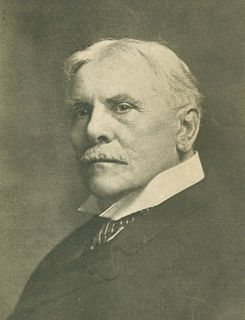A Quote by Charles Spurgeon
Saving faith is an immediate relation to Christ, accepting, receiving, resting upon Him alone, for justification, sanctification, and eternal life by virtue of God's grace.
Related Quotes
If a preacher is cultured, gentle, earnest, intellectual, and broadly tolerant, the sheep of God run after him. He, of course, speaks beautifully about Christ, and uses the old words redemption, the cross, even sacrifice and atonement-but what is his Gospel? That is the crucial question. Is salvation, perfect, entire, eternal,-justification, sanctification, glory,-the alone work of Christ, and the free gift of God to faith alone?
Justification and sanctification are both God's work, and while they can and must be distinguished, the Bible won't let us separate them. Both are gifts of our union with Christ, and within this double-blessing, justification is the root of sanctification and sanctification is the fruit of justification.
God works this unspeakable mystery of entire sanctification in your life and mine. People try to seek the experience of entire sanctification in ways other than God's way; but the wonderful Spirit of God will remove confusion and enable us to see that the only means to obtain the experience of entire sanctification by faith is the grace of God.
The inner change, justification, is effected at the moment of salvation. The outer change in the believer's daily walk, sanctification, continues throughout life. But the progressive work of sanctification is only fully effective when the radical, inner transformation of justification is realized and appropriated by faith.
A rigorous doctrine of imputation is not only limiting but ends up doing a disservice to the nature of grace and justification. It makes the transactions of the gospel basically juridical. In the Roman view, justification and sanctification are a seamless fabric. It is more than a question of God simply seeing us through a legal scrim of Christ's righteousness. Righteousness actually begins to transform us.
I'm afraid that in the United States of America today the prevailing doctrine of justification is not justification by faith alone. It is not even justification by good works or by a combination of faith and works. The prevailing notion of justification in our culture today is justification by death. All one has to do to be received into the everlasting arms of God is to die.
I fear it is sometimes forgotten that God has married together justification and sanctification. They are distinct and different things, beyond question, but one is never found without the other. All justified people are sanctified, and all sanctified people are justified. ... Tell me not of your justification, unless you have also some marks of sanctification. Boast not of Christ's work for you, unless you can show us the Spirit's work in you.
Our justification from sins takes place at the point of saving faith, not at the point of water baptism, which usually occurs later. But if a person is already justified and has sins forgiven eternally at the point of saving faith, then baptism is not necessary for forgiveness of sins nor for the bestowal of new spiritual life. Baptism, then, is not necessary for salvation. But it is necessary if we are to be obedient to Christ, for he commanded baptism for all who believe in him.
Ultimately, our lives hinge on the ability to make right choices and decisions. By God's grace, I made the most important decision a person can ever make. I invited Jesus Christ to be Lord of my life and made a commitment to follow Him. God offers each of us the free gift of eternal life through faith in Jesus by "confessing with your mouth that Jesus is Lord and believing in your heart that God raised him from the dead" (Romans 10:9). It is a wonderful and peaceful feeling to serve a God who loves me and cares about every detail of my life.
Solid scriptural theology should be valued in the church. Books in which Scripture is reverently regarded as the only rule of faith and practice-- books in which Christ and the Holy Ghost have their rightful office-- books in which justification, and sanctification, and regeneration, and faith, and grace, and holiness are clearly, distinctly, and accurately delineated and exhibited, these are the only books which do real good. Few things need reviving more than a taste for such books as these among readers.
It is never on account of its formal nature as a psychic act that faith is conceived in Scripture to be saving. It is not, strictly speaking, even faith in Christ that saves, but Christ that saves through faith. The saving power resides exclusively, not in the act of faith or the attitude of faith or nature of faith, but in the object of faith.
To be "in Christ" is to place one's trust in Him for salvation from sin. To be "in Christ" is to trust His goodness, not our own; to trust that His sacrificial death on the cross paid the complete debt of death we owe for our sin; to trust that His resurrection gives us eternal life instead of relying upon our own ability to please God. To be "in Christ" is to claim, by faith, the free gift of salvation. To be "in Christ" is to enjoy a completely restored relationship with our Father in heaven by virtue of His Son's righteous standing.




































